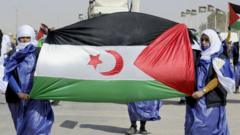The UK has maintained a neutral stance on the Western Sahara conflict for decades, referring to the area as a "non-self-governing territory" as defined by the UN. However, Lammy now describes Morocco's autonomy proposal as "the most credible, viable and pragmatic basis for a lasting resolution" to the territorial dispute that has persisted for over 50 years.
This diplomatic endorsement is significant not only for its political ramifications but also for the economic incentives it brings. Lammy secured agreements to enhance collaboration on critical projects related to the World Cup, which Morocco is co-hosting with Spain and Portugal in five years. The UK Foreign Office highlighted that this cooperation would allow British companies to compete in substantial public projects, bolstering their presence in Moroccan infrastructure sectors, including health and transport.
Algeria, which supports the independence aspirations of the Sahrawi people, expressed disappointment over the UK's shift, claiming that Morocco's autonomy proposal has not adequately been presented to the Sahrawis for negotiation. This marks an ongoing tension, as Algeria has historically backed the Polisario Front, the armed group advocating for Western Sahara's independence.
The situation in Western Sahara remains complex, with significant mineral wealth and a long history of conflict. Since the 1970s, Morocco has controlled most of the territory, while the Polisario Front holds parts of it. The international community remains divided, with countries like the United States and various European nations lending support to Morocco's stance.
British diplomats clarified that their endorsement of Morocco's plan is contingent on Morocco's commitment to further support self-determination and to engage in fresh negotiations. The two nations emphasized a mutual commitment to peaceful conflict resolution, reinforcing their relationship and collaborative outlook.
Morocco's Foreign Minister praised the UK’s backing, characterizing it as a historic pivot towards resolving a protracted dispute. As the potential for British businesses in Moroccan infrastructure grows, analysts will be closely monitoring the implications of this endorsement for future trade relations and regional stability in North Africa. The ongoing humanitarian and political situation in Western Sahara calls for continued attention as both nations move forward with their posturing in this historically sensitive area.
This diplomatic endorsement is significant not only for its political ramifications but also for the economic incentives it brings. Lammy secured agreements to enhance collaboration on critical projects related to the World Cup, which Morocco is co-hosting with Spain and Portugal in five years. The UK Foreign Office highlighted that this cooperation would allow British companies to compete in substantial public projects, bolstering their presence in Moroccan infrastructure sectors, including health and transport.
Algeria, which supports the independence aspirations of the Sahrawi people, expressed disappointment over the UK's shift, claiming that Morocco's autonomy proposal has not adequately been presented to the Sahrawis for negotiation. This marks an ongoing tension, as Algeria has historically backed the Polisario Front, the armed group advocating for Western Sahara's independence.
The situation in Western Sahara remains complex, with significant mineral wealth and a long history of conflict. Since the 1970s, Morocco has controlled most of the territory, while the Polisario Front holds parts of it. The international community remains divided, with countries like the United States and various European nations lending support to Morocco's stance.
British diplomats clarified that their endorsement of Morocco's plan is contingent on Morocco's commitment to further support self-determination and to engage in fresh negotiations. The two nations emphasized a mutual commitment to peaceful conflict resolution, reinforcing their relationship and collaborative outlook.
Morocco's Foreign Minister praised the UK’s backing, characterizing it as a historic pivot towards resolving a protracted dispute. As the potential for British businesses in Moroccan infrastructure grows, analysts will be closely monitoring the implications of this endorsement for future trade relations and regional stability in North Africa. The ongoing humanitarian and political situation in Western Sahara calls for continued attention as both nations move forward with their posturing in this historically sensitive area.





















